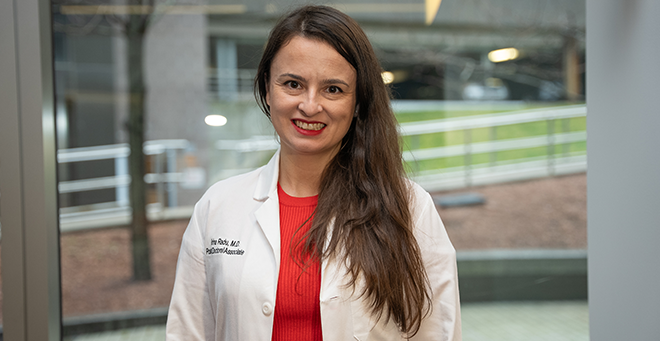
Across UMass Chan Medical School, affinity groups for people with shared identities and interests are fostering a community of collegiality and support. For the UMass Chan Postdoctoral Association (UMPA), that involves taking numerous steps to support postdocs from abroad to help them get acclimated and feel a sense of belonging at UMass Chan in Worcester.
A conversation with Irina Radu, MD, MHA, co-president of UMPA and postdoctoral research fellow focused on clinical and translational research in the lab of Khanh-Van Tran, MD, PhD, assistant professor of medicine, illuminated the challenges postdocs have faced, how they have navigated them and their plans for the future.
Dr. Radu said demographic data collected by the Office for Postdoctoral Scholars upon the inception of UMPA four years ago showed an average of 270 postdocs at UMass Chan with nearly 80 percent identifying as international individuals on visas. “Postdoctoral scholars who are predominantly international face more complex daily challenges compared to their American colleagues,” said Radu, who came to UMass Chan five years ago from Romania.
Radu said those challenges include fulfilling basic needs such as finding housing and transportation; obtaining a social security number, a driver’s license, a bank account or credit card; understanding benefits; and navigating tax requirements. As postdocs began to meet and discuss challenges when the group was formed, they shared resources with one another that made the transition to the United States easier.
The group created a forum where postdocs could share insights for addressing issues related to transitioning to working and living in a new country. They held international student welcome parties to create meaningful interactions with new postdocs and fostered digital connections to create community before they arrived at UMass Chan.
In addition to creating a welcoming space, UMPA has expanded the group’s purpose as one that raises awareness in the UMass Chan community about postdoc research and diversity-related topics through the adoption of a culture of collaboration. One of its most notable programs is the Breaking Bias workshop series that increases awareness of diversity- and equity-related issues in medicine and science. Radu credits the diligent efforts of group members, the Office of Postdoctoral Scholars and the Diversity and Inclusion Office for helping expand their portfolio of activities.
UMPA is working on a collaboration with UMass Chan Human Resources to organize webinars that will provide comprehensive information about UMass Chan benefits and policies tailored for postdocs.
“We are committed to expanding our social events to engage our colleagues further, nurturing the sense of belonging, and further reinforcing the fact that UMass Chan is not only an institution but also our home, and our place of educational and personal thriving,” Radu said.


